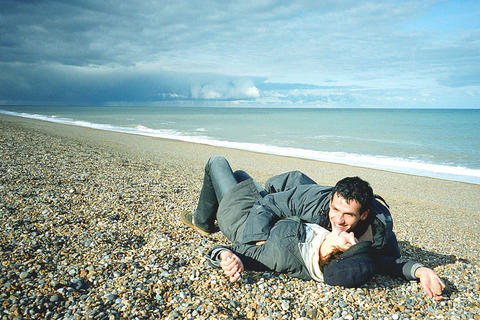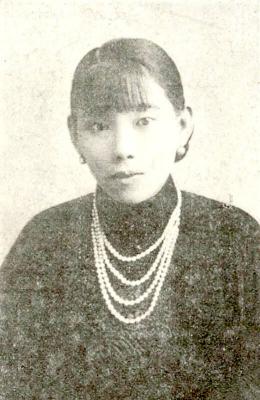The notion that our sexual behavior is the purest expression of our deepest selves is delicately explored in 9 Songs, Michael Winterbottom's lyrical, graphically explicit chronicle (although about a minute of those scenes has been cut from the version to be released in Taiwan) of an ordinary love affair between two attractive people. The movie is the first to scrutinize at length one couple's bedroom etiquette in a search for their identities. If anything, 9 Songs, conceived and directed by Michael Winterbottom (In This World and Welcome to Sarajevo) proves that showing what people do in bed may not reveal all that much. The truth lies hidden in their minds.
Matt (Kieran O'Brien), the narrator, is a British glaciologist remembering the recent past during an expedition to Antarctica. Lisa (Margo Stilley), the frisky, gamine lover he recalls with a mixture of fondness, exasperation and desire, is a headstrong 21-year-old American he meets at a rock concert in London.
With sexually explicit love scenes that depict the arc of their relationship in encounters that grow increasingly complicated and emotionally tricky, this brave, melancholy, unabashedly romantic movie would like to be the film many had hoped to see in the post-Deep Throat era. Three decades ago, when pornographic movie houses proliferated, and a love scene between Julie Christie and Donald Sutherland in Nicolas Roeg's Don't Look Now strongly suggested that actual sex was being filmed, the prospect of the final barrier being breached seemed imminent. But somehow it never happened. And then came the AIDS epidemic.

PHOTO COURTESY OF CINEPLEX
Winterbottom's film unfolds as the cinematic equivalent of a sustained rock ballad in which live performances attended by the couple in concert halls around London are interwoven with scenes of intimacy that might be compared to electric guitar riffs. The mostly melodic songs, by groups like Black Rebel Motorcycle Club, the Dandy Warhols and Primal Scream, are intended to comment on the relationship. But the songs are too obscure and their lyrics too unintelligible for a coherent dialogue between the concert hall and the bedroom.
As you watch Matt and Lisa make love (with condoms during intercourse), nagging questions hover. Who are they? Are they characters in a predetermined scenario that takes them into mild kinkiness (playful bondage, a visit to a table-dancing club, where a naked dancer tempts them)? Or are we watching actors improvise a screen relationship that may or may not be taking place offscreen? We never know. And without the anchor of a developed screenplay, they remain frustratingly elusive.
During the sex scenes, handsomely photographed in natural light, you never sense genuine abandonment. While not overtly self-conscious in front of the camera, both actors (but especially O'Brien) play it emotionally safe.
Scattered clues suggest who these people might be. In a voice-over, Matt describes Lisa as "egotistical, careless and crazy." And as the affair progresses, there are signs that the last of these adjectives may be accurate. Matt and Lisa sniff cocaine, but Lisa also takes unidentified pills of which Matt disapproves when they leave her groggy and irritable.
Lisa has a streak of emotional and physical violence. In one love scene she declares that she wants to bite Matt's lip until it bleeds and causes him physical pain. In another she slaps him lightly across the face. Early in the movie Matt says he loves her and jumps into the icy sea to prove it, and she shouts back that she loves him too.
Matt's impressions of Antarctica strain for metaphoric weight. Close to the South Pole, he observes, "claustrophobia and agoraphobia are in the same place, like two people in a bed." The fact that Lisa doesn't get her own commentary gives Matt the advantage and lends the movie the slight flavor of a locker-room tale told at a woman's expense.
But 9 Songs is lovely to watch. Especially when it forsakes the concert hall and visits the English seaside, the film acquires the high romantic gloss of A Man and a Woman. At such moments, Matt and Lisa begin to suggest prototypical, somewhat idealized modern lovers, two pretty people inviting a soft-core fantasy of romance at twilight.

Many people noticed the flood of pro-China propaganda across a number of venues in recent weeks that looks like a coordinated assault on US Taiwan policy. It does look like an effort intended to influence the US before the meeting between US President Donald Trump and Chinese dictator Xi Jinping (習近平) over the weekend. Jennifer Kavanagh’s piece in the New York Times in September appears to be the opening strike of the current campaign. She followed up last week in the Lowy Interpreter, blaming the US for causing the PRC to escalate in the Philippines and Taiwan, saying that as

US President Donald Trump may have hoped for an impromptu talk with his old friend Kim Jong-un during a recent trip to Asia, but analysts say the increasingly emboldened North Korean despot had few good reasons to join the photo-op. Trump sent repeated overtures to Kim during his barnstorming tour of Asia, saying he was “100 percent” open to a meeting and even bucking decades of US policy by conceding that North Korea was “sort of a nuclear power.” But Pyongyang kept mum on the invitation, instead firing off missiles and sending its foreign minister to Russia and Belarus, with whom it

The Chinese Communist Party (CCP) has a dystopian, radical and dangerous conception of itself. Few are aware of this very fundamental difference between how they view power and how the rest of the world does. Even those of us who have lived in China sometimes fall back into the trap of viewing it through the lens of the power relationships common throughout the rest of the world, instead of understanding the CCP as it conceives of itself. Broadly speaking, the concepts of the people, race, culture, civilization, nation, government and religion are separate, though often overlapping and intertwined. A government

Nov. 3 to Nov. 9 In 1925, 18-year-old Huang Chin-chuan (黃金川) penned the following words: “When will the day of women’s equal rights arrive, so that my talents won’t drift away in the eastern stream?” These were the closing lines to her poem “Female Student” (女學生), which expressed her unwillingness to be confined to traditional female roles and her desire to study and explore the world. Born to a wealthy family on Nov. 5, 1907, Huang was able to study in Japan — a rare privilege for women in her time — and even made a name for herself in the